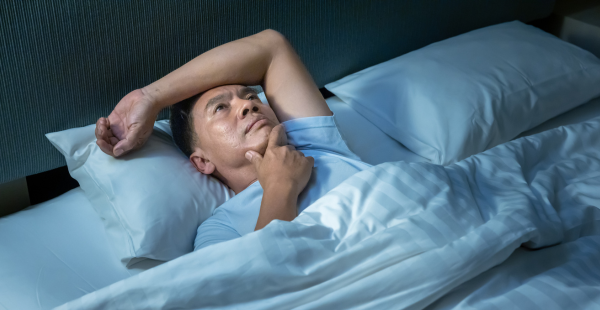Insomnia can refer to difficulty getting to sleep, difficulty staying asleep, waking up early without being able to return to sleep, or a combination of the three. In order to be diagnosed with insomnia, sleep difficulty must occur at least 3 nights per week even though the opportunity for adequate sleep is available. It must also interfere with your life and functioning – for example, if you wake feeling unrefreshed or find yourself dozing during the day.

Insomnia is not defined based on how many hours you’ve slept, since the amount people need can vary from person to person. It is also normal to sleep less as you age. If you’re sleeping less than you did when you were younger, it doesn’t necessarily mean you have insomnia.
Insomnia is a very common medical complaint. About 10% of adults in Canada experience persistent insomnia, and an additional 20% to 25% report occasional insomnia. It is more common among women, older adults, shift workers, and people with medical conditions and mental health issues.
Insomnia usually has an underlying cause. Common causes of insomnia include:
Short-term insomnia (insomnia that lasts less than 3 months) is usually caused by temporary stressors such as changes in sleep environment (e.g., noise, light, and temperature), a stressful event (e.g., death or illness of a family member, job loss, surgery, divorce), travelling, and shift work. The insomnia often goes away when the stressor is resolved. Chronic insomnia, which occurs 3 or more nights a week, and lasts at least 3 months, is usually caused by factors such as medical illness, medication and mental health issues. Insomnia can also occur on its own.
A treatment plan for insomnia can include treating an underlying medical problem, learning about and practicing good sleep hygiene, learning about and making behaviour changes, and taking sleep medications. If insomnia is caused by an underlying medical condition such as arthritis or depression, the condition should be treated first, as this will likely alleviate the insomnia.
Cognitive behavior therapy for insomnia is recommended as the first-line treatment, when available, and also incorporates many of the suggestions below.
Sleep hygiene includes basic things you can do to increase your chances of having a good night’s sleep. Changing certain behaviours can also help improve sleep. As part of a treatment plan, your doctor might recommend any of the following sleep hygiene or behaviour changes:
Cognitive behaviour therapy for insomnia is also available and incorporates many of the suggestions above. Your doctor may also prescribe a sleep medication if non-medication approaches haven’t helped. These medications can help you sleep better at first, but they are not a cure and may even worsen insomnia if used for long periods of time. This happens when sleeping medications are stopped and the insomnia symptoms return and worsen. Benzodiazepines (e.g., temazepam*, triazolam, lorazepam, diazepam) are commonly used medications for insomnia. There are several benzodiazepines that can be used, although some have been studied more than others. Your doctor will consider your age, other medical conditions, and side effects of the benzodiazepine when selecting the one that is best for you. Some people can become physically dependent on benzodiazepines and experience withdrawal symptoms when they stop using them.
Many sleep medicines can also lead to tolerance (a reduced effect over time). For this reason, doctors use more precautions when prescribing them for long periods unless other treatments fail or it is clear that there is a low risk of developing tolerance. These sleep medicines should never be combined with alcohol. Other medications used to treat insomnia include zopiclone and zolpidem, which are not benzodiazepines, but work similarly.
Another class of medications for insomnia are orexin receptor antagonists. Orexin receptor antagonists (e.g., lemborexant) work by blocking wakefulness, rather than promoting sleepiness. Some antidepressants, such as trazodone and mirtazapine, have sedating properties, and may be prescribed to those with depression that are also experiencing issues with insomnia.
If you are prescribed a medication to help with sleep, it’s important to continue to use non-medication approaches as well.
If odd working hours disturb your sleep rhythm, the best way to get back on track is to expose yourself to bright light in the morning. The evidence shows that this may reset the body clock more effectively than taking melatonin, which is available over the counter. Natural light causes the brain to later produce melatonin in darkness anyway.
Non-prescription medications that contain diphenhydramine are available for short-term use. However, they should not be used on a long-term basis. It is recommended to discuss using this medication with a health care professional first. If you find that you have sleep problems, it is best to see your doctor for a proper assessment.
All material copyright MediResource Inc. 1996 – 2025. Terms and conditions of use. The contents herein are for informational purposes only. Always seek the advice of your physician or other qualified health provider with any questions you may have regarding a medical condition. Source: www.medbroadcast.com/condition/getcondition/Insomnia
Pharmasave uses cookies to provide a personalized experience, analyze traffic, improve site performance, and provide social media features. By using our site, you agree to our privacy policy.